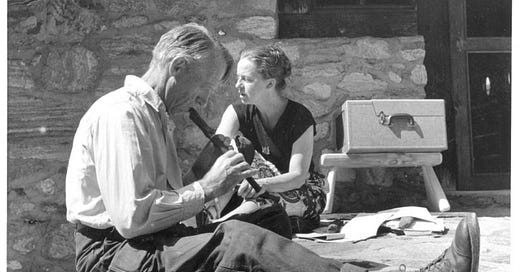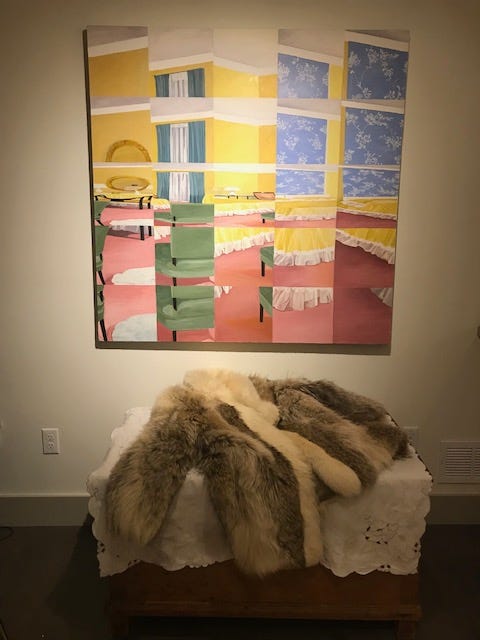Coming Out of Trance
Calling All Grand Mothers, Alice Walker
We have to live differently or we will die in the same old ways.
In my frenzy to learn how to live differently in the face of the existential threat of the climate crisis and to offer some of that knowledge to FreeportCAN, I’ve spent the last few months reading almost nothing but the literature on global warming. I’ve waited years for Anthony Doerr to publish another book after his last and much beloved novel, “All the Light You Cannot See.” Now that book, “Cloud Cuckoo Land,” has finally arrived, but sits, still unread, beside my bed.
This is not the first time I’ve awakened to the need to make a cultural, philosophical, and economic shift in order to live in harmony with the planet and turned to books for answers. Or the first time I’ve taken steps along a path to change. In 1975, Bob and I lived on the 20th floor of a posh high-rise overlooking Lake Michigan and the skyline of Chicago whose lights blinked off and on at us in the night like messages from lesser gods. Bob was a partner in a big law firm in Chicago. I had a private psychotherapy practice in an office on Michigan Avenue where, on my walk home, the windows of Bonwit Teller flashed white furs and leather coats into my dreamworld. We had it all and, it was reasonable to assume, we were about to have even more.
That’s when we gave it all up. We said goodbye to our friends. I said goodbye to my patients. We packed everything we had, including over 100 plants and a red velvet sofa and a pair of antique gold threaded tapestries, into a U-Haul truck and drove 1,000 miles east over I 90 to Portland where we knew no one, but hoped to find what we were calling “the simple life.” As members of a book club in Chicago, we’d read “Small Is Beautiful,” by E.F. Schumacher. I think it was that book that galvanized our feeling that the future with those white furs, country club memberships, P1800 Volvo sports cars wasn’t going to make us happy and just might destroy the world.
We took with us books like “Diet for a Small Planet,” by Frances Moore Lappe, and “The Whole Earth Catalogue” and “Living the Good Life,” by Helen and Scott Nearing, founders of the “back to the land” movement whose goal was to liberate its followers from exploitation of the planet by working the earth and eating homegrown organic food.
I know a lot of people who successfully embraced this back to the land life, who built their own homes out of wood harvested from their land, grew their own food and tanned hides for clothing. I know some people Downeast, in Addison and Harrington, whose commitment to this way of life continues to bring them great joy and satisfaction and the admiration of many. Bob and I aren’t among any of those people. We did manage to eat a vegetarian diet into our sixties and raise our kids on one. For a short time we grew asparagus in the back yard and chopped wood and heated with it, not taking into account the carbon stored in wood, only the evil of oil. We made our own bread and tapped maple trees and were careful not to go overboard at Christmas.
But by the 80’s, my world view about living lightly on the land and not consuming everything in sight like a hungry bear in spring had disappeared over the horizon like a summer rain cloud. I was entranced again with shiny things in windows, only this time, I didn’t question it.
In Freeport, Dansk replaced Leightons, an old family five-and-dime store. I coveted Dansk’s wooden cheese boards, ceramic bowls and woven napkins. Other big brand stores soon moved to town. I was the first customer one early Saturday morning at Ralph Lauren’s new store opening. I went to the sales at Maine Cottage Furniture in March and one year I bought a couch so large they had to take out a window to get it into the house. I even bought that white fur: a fox coat found at a furrier in Montreal. I’ve kept it in a closet in the basement for years now, and whenever I happen upon it I feel a tinge of shame. On the other hand, in honor of those animals, I think I should make good use of the coat. But now, it rarely gets cold enough to wear it.
We were living the (unexamined) good life. Bob was a partner again in a law firm, I had a private practice in our home in Freeport. We had plenty of money, no student loans to pay off. Housing was cheap.
And carbon dioxide was building faster in the atmosphere during this time than at any other time in history. James Hansen warned about it in Congressional testimony in 1988. Bill McKibben warned us about it 1989 when he wrote “The End of Nature.” But I was in a trance, raising children, working, floating high on the economy’s expansion, on old stories of America’s greatness and possibility. Racial injustice, economic inequality, the exploitation of nature: all were distant concerns, far from my everyday consciousness.
It has taken me a long time to waken from my trance, but now, faced with fires and hurricanes and scorching heat, I am taking stock of the damage this giddy and profligate feast on the natural resources of the planet has wrought and I am appalled, and sorry and terribly saddened.
How did those good people Downeast hold onto their vision of living in harmony with the earth? Why did I so easily submit to the trance of unfettered capitalism? I don’t want to conclude it’s only because they are better souls than I, though I suspect it’s true. I think in part it may have happened because they lived in an intentional community of people who supported their imagination and purpose and values, whereas when we moved to Maine, we did not seek that kind of community. The closest we got to choosing community was in choosing not to move to Cape Elizabeth or Falmouth or even Yarmouth, all towns crowded with people carrying handbags with whales printed on them, the secret insignia of folks with Yuppie aspirations, I thought smugly to myself back then, not recognizing my own Yuppie insignia.
I haven’t yet found in my reading about how to live a life in harmony with the needs of this dying planet any books that I think will have a comparable effect on our culture as the books which changed my world view in the mid-seventies. Next week I will write about the ones I have found. I’d love to hear from readers about any books they recommend.
Which brings me back to community, to FreeportCAN and the word “together.” Perhaps this time, by working in community my peers and I will imagine a narrative about what a regenerative life lived in harmony with the planet’s ecosystems consists of. Perhaps we can support each other to hold fast to that life over the length of time left before us.
I leave you with Alice Walker’s call to action:
I call on / all the / Grand Mothers / of Earth / & every person / who possesses / the Grand Mother / spirit / of respect for / life / & protection of / the young / to rise / & lead.





